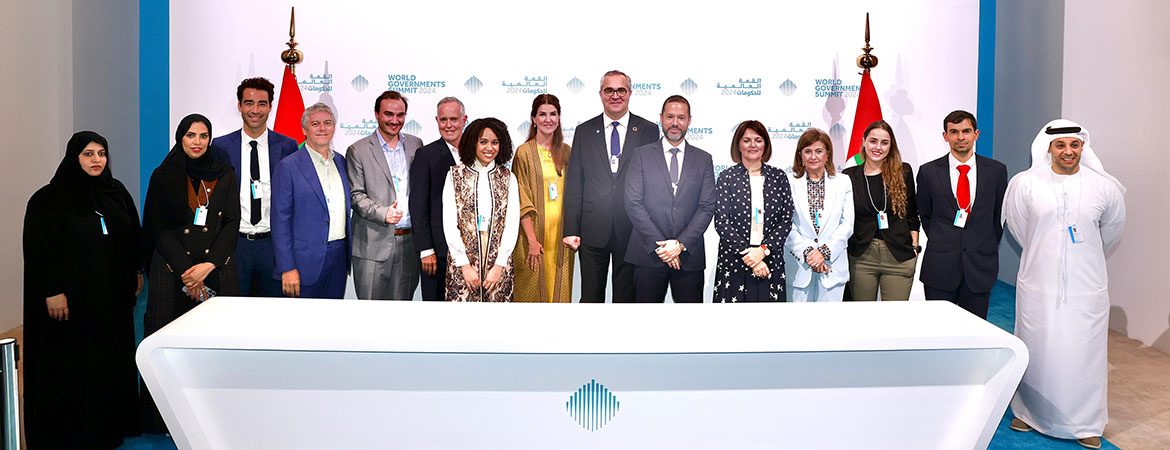UN-Habitat and Dubai Municipality concluded yesterday the 13th cycle of the Dubai International Best Practices Award for Sustainable Development. The ceremony was held this year at the World Governments Summit 2024. The award recognises excellence and best practices in sustainable urban development as a result of effective partnerships between the public, private and civic sectors.
Following a 28-year long partnership between UN-Habitat and Dubai Municipality, the award recognises this year five innovative projects driving positive impact and improving quality of life in cities.
Michal Mlynàr, United Nations Assistant Secretary-General and Acting Executive Director of UN-Habitat, stated: “I congratulate the winners of Dubai International Best Practices Award for Sustainable Development – 13th cycle. I am also proud that UN-Habitat and Dubai Municipality have nurtured a strong partnership for 28 years, recognising and encouraging excellence in promoting sustainable urban development for people. Together, we shape a better future for human settlements worldwide.”
Best urban regeneration project
Italy’s “BAM – Biblioteca degli Alberi Milano” was awarded the Best Practices Award in the category of Urban Regeneration and Public Places. Part of the urban development project of Porta Nuova district, this project is the first in the world to secure both the Leadership in Energy and Environmental Design (LEED) and WELL Community certifications.
The project centred around the creation and design of a contemporary park featuring innovative gardens where visitors can enjoy cultural experiences in harmony with nature. The park aims to create a well-kept, safe and lively public space in the heart of Milan, evolving together with the city. The project is the outcome of an innovative collaboration between the Municipality of Milan, the Riccardo Catella Foundation, and COIMA.
Most innovative and iconic building
The “Scion Innovation Hub – Te Whare Nui o Tuteata” project of New Zealand secured the award in the category of the most beautiful, innovative and iconic building.
This project reimagines the headquarters of the Scion Research institute, which specialises in technology development for forestry. Located on the outskirts of Redwoods in the Whakarewarewa forest, the primary goal of this project is to bring together a workforce that was previously dispersed across various small buildings across the campus in one central innovation hub. It also seeks to improve the institute’s public interface by building a new campus entry point.
Best urban food systems project
The “EatCloud Zero Food Waste – Zero Emissions – Zero Hunger” project of Colombia has been awarded the Best Practices Award in sustaining urban food systems. The project is led by EatCloud, a start-up company that is currently redistributing the largest portion of unsold food globally. The company’s major objectives include using data-driven solutions to reduce food waste, combat hunger and help the environment.
The project automates the management of excess food using artificial intelligence (AI), which results in significant cost savings in logistics and offers tax benefits.
Best pollution reduction project
The “Gree Energy (The Hamparan Project) – Avoiding methane emissions from a cassava starch factory and generating clean energy” won the Best Practices Award in the category of addressing climate change and reducing pollution.
As part of this project, Gree Energy offers solutions for the cassava starch factory Hamparan, which had been dealing with unreliable electricity sources and methane emissions from wastewater treatment. The company was able to successfully convert produced biogas into electricity, which reduced harmful methane emissions and improved water quality for the local community.
By leveraging their track record in making such projects financially sustainable, Gree Energy was able to make a positive impact for underserved rural communities and the global food supply chain.
Best urban management project
The “Local Area Development Plan (LADP)” of Egypt has been awarded the Best Practices Award in urban infrastructure planning and management. The LADP seeks to develop a detailed blueprint for the many informal areas of Greater Cairo. The goal is to highlight the importance of stakeholder participation in the decision-making process and forge a strong connection between planning phase and service execution.
Three different projects of the suggested plans have been executed. These plans involve revamping a fish market, renovating a school, and transforming an open canal and paving roads in various areas.
His Highness Sheikh Ahmed bin Mohammed bin Rashid Al Maktoum, Second Deputy Ruler of Dubai, stated: “We would like to commend all the recipients of the Dubai International Best Practices Award for Sustainable Development. The award successfully served as a global platform for stimulating creative minds and inspiring individuals to design more innovative and ground-breaking solutions that contribute to building the cities of the future. Furthermore, this award has been instrumental in constructing inclusive communities with sustainable and integrated health, food, environmental systems as well as digital and smart engineering infrastructure, which help provide the best quality of life and well-being for future generations.”
The Dubai International Award for Sustainable Development was established in 1995 under the directive of the late Sheikh Maktoum Bin Rashid Al Maktoum to recognise initiatives that positively impact the living environment.
